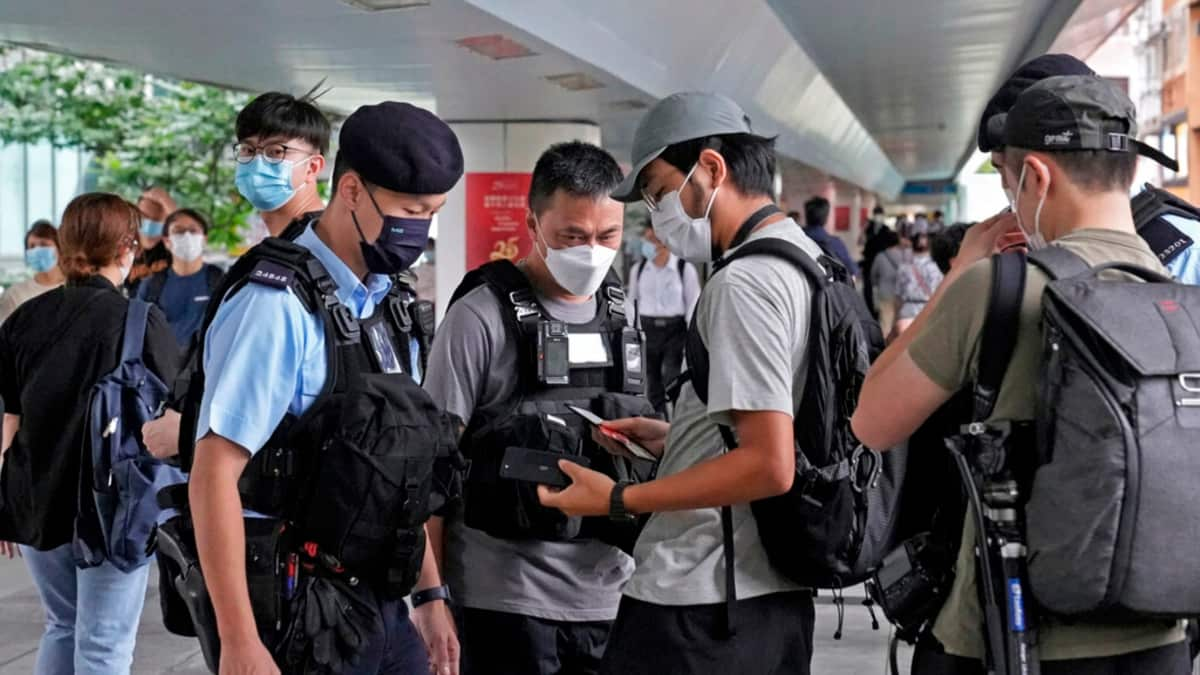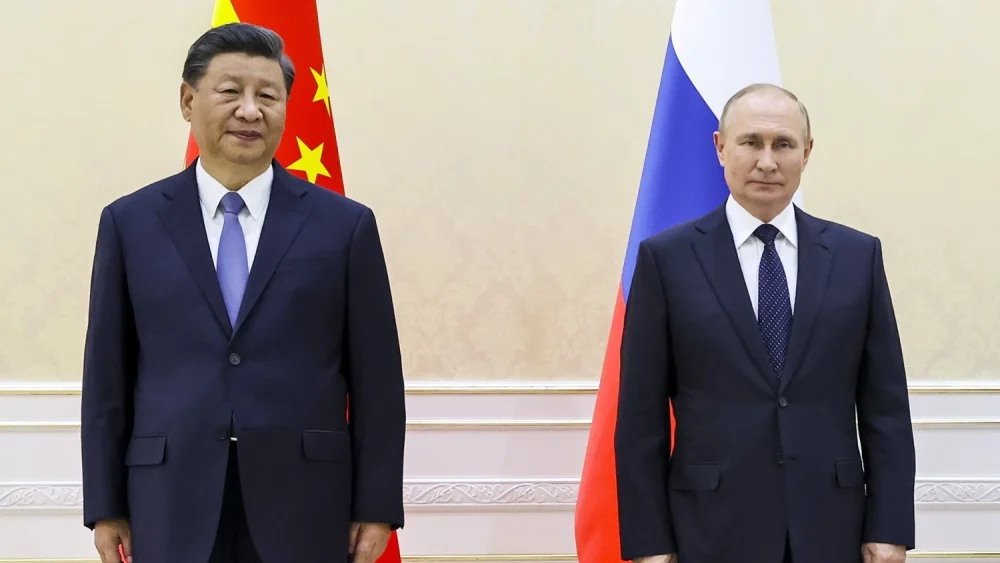Top stories
Report Exposes Surveillance and Harassment of Journalists Covering China

In an era where journalism faces increasing challenges, reporting from within China presents unique hurdles. A recent report sheds light on the extent of surveillance and harassment faced by journalists covering China. The findings underscore the daunting environment for both local and foreign journalists striving to deliver accurate and independent news.
One of the key revelations of the report is the pervasive surveillance faced by journalists. From intrusive monitoring of digital communications to physical tailing, journalists operating in China are constantly under watch. This not only undermines their ability to gather information but also raises concerns about privacy and freedom of the press.
Moreover, the report highlights the various forms of harassment and intimidation tactics employed against journalists. These range from subtle warnings and pressure tactics to outright detention and expulsion. Such tactics not only create a chilling effect on reporting but also pose serious risks to the safety and well-being of journalists.
The report also sheds light on the challenges faced by foreign journalists in renewing their press credentials in China. The opaque and arbitrary nature of the accreditation process adds to the uncertainty and insecurity faced by journalists operating in the country. This further restricts their ability to report freely and independently.
Furthermore, the report underscores the broader implications of China’s restrictive media environment. Beyond hindering journalistic endeavors, such practices contribute to a broader climate of censorship and control. This not only impacts the flow of information within China but also influences global perceptions and understanding of the country.
In conclusion, the report serves as a stark reminder of the formidable obstacles faced by journalists covering China. From pervasive surveillance to overt harassment, the challenges are manifold. Despite these challenges, journalists continue to strive to fulfill their vital role in providing accurate and independent news coverage. However, the findings of the report underscore the urgent need for greater transparency, accountability, and respect for press freedom within China.
Crime
Swiss court jails Gambian ex-minister for crimes against humanity

The Federal Criminal Court of Switzerland on Wednesday convicted former Gambian Interior Minister Ousman Sonko for crimes against humanity and sentenced him to 20 years in prison.
BY GUEST ESSAY:
In a landmark ruling, a Swiss court has convicted a former Gambian Interior Minister Ousman Sonko for crimes against humanity, marking a significant victory for justice and accountability. The verdict underscores the global community’s unwavering commitment to holding perpetrators of grave human rights violations accountable, regardless of their position or nationality.
The convicted ex-minister, whose name was not disclosed in the report, stood accused of perpetrating heinous crimes during their tenure in government, including acts of torture, extrajudicial killings, and enforced disappearances. The court’s decision to convict them sends a powerful message that those responsible for egregious human rights abuses will be held to account for their actions, no matter where they seek refuge.
The case represents a triumph for the victims and survivors of the atrocities committed by the ex-minister and their accomplices. It acknowledges their suffering and acknowledges the importance of seeking justice for past injustices. The verdict also serves as a source of hope for victims of human rights abuses worldwide, demonstrating that justice can prevail even in the face of formidable challenges.
Switzerland’s role in prosecuting the ex-minister underscores the country’s commitment to upholding the principles of international law and protecting human rights. By providing a forum for holding perpetrators accountable, Switzerland sets a precedent for other nations to follow suit in pursuing justice for victims of human rights violations.
The conviction of the Gambian ex-minister also highlights the importance of international cooperation in addressing impunity for human rights abuses. It underscores the need for collaboration among countries to investigate and prosecute individuals suspected of committing crimes against humanity, regardless of where the crimes were perpetrated.
While the verdict represents a significant milestone in the pursuit of justice, it also serves as a reminder of the ongoing need to address impunity and prevent future atrocities. It underscores the importance of strengthening national and international legal frameworks to ensure accountability for human rights violations and prevent impunity.
In conclusion, the conviction of the Gambian ex-minister for crimes against humanity represents a significant victory for justice and accountability. It sends a clear message that perpetrators of grave human rights abuses will be held accountable for their actions, and that victims will not be forgotten. As the global community continues to strive for a world free from impunity, this landmark verdict serves as a beacon of hope for all those who seek justice and redress for past atrocities.
Analysis
Xi lauds China-Russia ties as Putin lands in Beijing
Analysis
The Devastating Impact of Khat: A Comprehensive Analysis of Somaliland’s Crisis

Unveiling the Religious, Health, Economic, and Environmental Ravages of Khat Consumption in Somaliland
By Kasim Abdulkadir:
In the tranquil streets of Somaliland, an invisible enemy lurks, threatening the essence of society and corroding its foundations. This enemy is none other than Khat, a narcotic plant wreaking havoc on the religious, health, economic, moral, hygienic, and environmental spheres of Somaliland.
- Religious Problems of Khat: Khat’s insidious infiltration into the societal fabric of Somaliland has unleashed a myriad of religious challenges. The gluttonous consumption of Khat undermines the completeness of faith, diverting individuals from their religious obligations. Fasting, the cornerstone of religious practice, is undermined by Khat consumption, hindering individuals from fulfilling their sacred duties.
- Health Problems of Khat: The detrimental impact of Khat on public health cannot be overstated. From neurological impairment to digestive disturbances, Khat inflicts severe harm on the human body. Its consumption weakens the immune system, rendering individuals susceptible to illness and posing grave risks to their overall well-being.
- Financial Problems of Khat: Khat’s pervasive influence extends to the economic realm, paralyzing communities and draining resources. The economic paralysis induced by Khat consumption disrupts livelihoods and perpetuates cycles of poverty. Scarce financial resources are squandered on Khat, exacerbating economic inequalities and stifling progress.
- Moral Problems of Khat: In a society anchored in the principles of Islam, Khat engenders moral degradation, eroding the fabric of social cohesion. The vile behavior exhibited by Khat users stands in stark contrast to the moral virtues espoused by Islam, perpetuating discord and disharmony within communities.
- Hygienic Problems of Khat: Khat’s consumption fosters neglect of personal hygiene, exacerbating societal challenges and perpetuating unhygienic living conditions. The relentless pursuit of Khat leaves individuals devoid of the inclination to maintain cleanliness, further exacerbating public health concerns.
- Family Problems of Khat: The scourge of Khat precipitates familial discord, tearing apart the fabric of familial bonds and disrupting domestic tranquility. Marital strife, fueled by the financial strain of Khat consumption, destabilizes households and undermines familial cohesion.
- Environmental Problems of Khat: As Khat consumption proliferates, it exacts a heavy toll on the environment, polluting ecosystems and despoiling landscapes. The wanton disposal of Khat waste contaminates soil and disrupts natural habitats, threatening biodiversity and compromising environmental sustainability.
Conclusion: The pernicious influence of Khat permeates every facet of Somaliland society, leaving devastation in its wake. Urgent measures are imperative to combat this existential threat and safeguard the future of Somaliland. Only through concerted efforts to address the religious, health, economic, moral, hygienic, and environmental ramifications of Khat consumption can Somaliland reclaim its vitality and resilience.
The Poisoned Chalice: Battling the Khat Epidemic in Somaliland
In the face of adversity, Somaliland must unite to confront the scourge of Khat and forge a path towards renewal and prosperity.
Editor's Pick
Australia plans limits on international students

Australia to Impose Limits on International Student Numbers
BY GUEST ESSAY:
Australia has unveiled plans to introduce limits on the number of international students allowed to study in the country. The move has sparked debate over the potential implications for the education sector and the broader economy.
The proposed limits come amidst growing concerns about the strain on infrastructure and public services in major cities, where a significant portion of international students reside. The influx of students has also raised questions about housing affordability and job opportunities for local residents.
While international education is a lucrative industry for Australia, contributing billions of dollars to the economy each year, critics argue that the focus on quantity over quality has led to issues such as exploitation of foreign students and declining academic standards.
Proponents of the new restrictions argue that they are necessary to address overcrowding and ensure that resources are allocated more effectively. They also point to the need to prioritize the interests of Australian citizens and residents, particularly in light of the challenges posed by the COVID-19 pandemic.
However, opponents warn that imposing limits on international student numbers could have negative consequences for the education sector, including reduced revenue for universities and job losses in related industries such as hospitality and tourism.
The announcement has reignited discussions about the role of international education in Australia’s economic recovery and its broader significance for the country’s cultural diversity and global reputation. It has also prompted calls for a more balanced approach to managing student intake, taking into account both economic and social considerations.
As the government moves forward with its plans to implement limits on international student numbers, stakeholders across the education sector are closely monitoring developments and advocating for policies that strike the right balance between economic growth and social responsibility.
Report
Pentagon Fails to Compensate Civilian Victims Despite Evidence of Drone Strike in Somalia

Despite evidence of civilian casualties in a 2018 drone strike in Somalia, the Pentagon failed to compensate the victims, highlighting a systemic issue in addressing civilian harm.
BY GUEST ESSAY:
The Pentagon’s recent report on civilian casualties resulting from U.S. military operations has drawn criticism for its failure to compensate victims, including a 22-year-old woman and her 4-year-old daughter killed in a 2018 drone strike in Somalia. Despite acknowledging their deaths, the Pentagon has yet to offer any form of compensation to the family.
The April 1, 2018 attack in Somalia claimed the lives of at least three civilians, including Luul Dahir Mohamed and her daughter Mariam Shilow Muse. Despite efforts by the family to contact the U.S. government and seek redress, they have received no response or acknowledgment of responsibility.
Annie Shiel, U.S. advocacy director at the Center for Civilians in Conflict, expressed disappointment at the Pentagon’s inaction, emphasizing the need for accountability and justice for civilian victims. The failure to compensate victims, despite significant funding allocated by Congress, underscores systemic issues in addressing civilian harm.
The Pentagon’s report, issued almost a year after its deadline, also highlights broader concerns about transparency and accountability in U.S. military operations. Despite claims of minimal civilian casualties, independent monitoring groups suggest a much higher toll, raising questions about the accuracy of official figures.
Efforts to improve the Pentagon’s response to civilian harm, such as the Civilian Harm Mitigation and Response Action Plan, have been criticized for their lack of effectiveness. Despite congressional appropriations for compensation payments, the Pentagon has shown reluctance to acknowledge its mistakes and provide restitution to victims.
Calls from elected officials and human rights organizations for compensation to be made to victims of U.S. attacks, including Luul and Mariam’s family, have yet to be heeded. The Defense Department’s failure to meet deadlines for releasing civilian casualty reports further undermines transparency and accountability in military operations.
As the U.S. continues its military engagements around the world, addressing civilian harm must be a priority. Without meaningful accountability and restitution for victims, the cycle of violence and suffering is likely to persist, undermining efforts to promote peace and stability.
Editor's Pick
Biden sharply hikes US tariffs on billions in Chinese chips, cars

Biden Administration Escalates Tariffs on Chinese Chips and Cars
BY GUEST ESSAY:
Explore the latest move by the Biden administration to sharply increase tariffs on Chinese chips and cars, analyzing its impact on trade relations and global supply chains.
In a significant escalation of trade tensions between the United States and China, the Biden administration has announced a sharp increase in tariffs on billions of dollars’ worth of Chinese chips and cars. The move marks a departure from the previous administration’s approach and signals a tougher stance on trade with China.
The decision to hike tariffs comes amid growing concerns about China’s trade practices and alleged unfair competition in key industries such as semiconductor manufacturing and automotive production.
The Biden administration has cited the need to protect American industries and jobs as a primary motivation for the tariff increase.
Under the new measures, tariffs on certain Chinese-made semiconductor chips will nearly double, while tariffs on imported Chinese cars and auto parts will also see a significant increase. The move is expected to impact a wide range of industries and could disrupt global supply chains that rely on Chinese-manufactured components.
The decision to sharply hike tariffs reflects the Biden administration’s broader strategy of prioritizing American interests in trade negotiations with China. President Biden has repeatedly emphasized the need to address China’s trade practices, including intellectual property theft, forced technology transfer, and unfair subsidies to domestic industries.
However, the move has drawn criticism from some quarters, with opponents warning that higher tariffs could ultimately harm American consumers and businesses. Critics argue that tariffs function as a tax on imported goods, leading to higher prices for consumers and potentially sparking retaliation from China.
Moreover, the escalation of tariffs could further strain relations between the world’s two largest economies and complicate efforts to address other pressing issues such as climate change, cybersecurity, and regional security. The Biden administration has sought to engage with China on areas of mutual interest while pushing back against perceived economic threats.
The decision to sharply increase tariffs on Chinese chips and cars underscores the challenges facing the Biden administration in managing its relationship with China. Trade tensions between the two countries have persisted for years, with both sides imposing tariffs on billions of dollars’ worth of goods.
As the Biden administration seeks to navigate these challenges, it faces pressure to balance competing interests and priorities. The move to hike tariffs on Chinese chips and cars reflects a broader strategy of promoting American competitiveness and protecting critical industries, but it also carries risks of economic disruption and further deterioration in bilateral relations.
As the situation continues to evolve, the impact of the tariff increase on global trade and supply chains remains uncertain. The Biden administration will need to carefully monitor developments and assess the effectiveness of its trade policies in achieving its broader economic and strategic objectives.
Editor's Pick
Evidence bomb goes off: Star witness Cohen pins porn payment on Trump

The latest revelations from Michael Cohen, unveiling Trump’s alleged involvement in hush money payments to a porn star, shedding light on legal and political implications.
BY GUEST ESSAY:
Michael Cohen, former attorney and fixer for Donald Trump, has disclosed that Trump allegedly ordered a hush money payment to a porn star. The revelation adds another layer of controversy to the tumultuous tenure of the former U.S. president, raising significant legal and political questions.
According to Cohen, Trump directed him to arrange a payment of hush money to Stormy Daniels, an adult film actress, to silence her about an alleged affair with Trump prior to the 2016 presidential election. Cohen’s admission provides further evidence of Trump’s involvement in efforts to conceal potentially damaging information during his presidential campaign.
The revelation has sparked renewed scrutiny into Trump’s conduct and could have significant legal implications. Campaign finance laws prohibit the use of corporate funds for political purposes, raising questions about the legality of the hush money payment and whether it constituted an illegal campaign contribution.
Moreover, Cohen’s disclosure could bolster ongoing investigations into Trump’s financial dealings and potential violations of campaign finance laws. Special prosecutors and congressional committees have been probing various aspects of Trump’s finances and conduct, and Cohen’s testimony could provide valuable insights into these investigations.
From a political perspective, the revelation could further erode Trump’s already tarnished reputation and damage his prospects for a political comeback. Allegations of misconduct and ethical lapses have dogged Trump throughout his presidency and beyond, and Cohen’s testimony adds fuel to the fire of public scrutiny.
However, Trump and his allies have dismissed Cohen’s claims as baseless and politically motivated. They have characterized Cohen as a disgruntled former employee seeking to settle scores with his former boss, casting doubt on the credibility of his allegations.
Despite these denials, Cohen’s testimony adds to the mounting legal and political challenges facing Trump and his inner circle. The revelation underscores the importance of accountability and transparency in government and highlights the need for thorough investigations into allegations of wrongdoing.
As the legal and political fallout from Cohen’s revelation unfolds, the American public will be watching closely to see how Trump and his allies respond. The controversy surrounding the hush money payment to a porn star adds another chapter to the ongoing saga of Trump’s tumultuous presidency, shaping the political landscape for years to come.
Editor's Pick
Conflict, violence push global internal displacement to record high levels

The number of internally displaced people around the world is at a record high – well over 70 million – it’s a global crisis
Explore the factors behind the surge in global internal displacement as conflict and violence reach record highs, shaping the humanitarian crisis worldwide.
BY GUEST ESSAY:
Amidst escalating conflict and violence across various regions, global internal displacement has soared to unprecedented levels, exacerbating the humanitarian crisis on a global scale. The surge in displacement reflects the grim reality faced by millions of individuals and families who are forcibly uprooted from their homes, seeking safety and refuge amidst the chaos of conflict.
From the ongoing conflicts in the Middle East to the civil unrest in Africa and beyond, the root causes of internal displacement are varied and complex. Political instability, ethnic tensions, economic hardships, and environmental disasters all contribute to the displacement crisis, driving millions of people from their homes and communities.
The impact of internal displacement is profound, with individuals and families facing immense challenges as they struggle to rebuild their lives in unfamiliar and often hostile environments. Displaced populations are particularly vulnerable to poverty, hunger, and disease, with limited access to essential services such as healthcare, education, and employment.
Moreover, the psychological toll of displacement cannot be overstated, as individuals grapple with the trauma of violence, loss, and displacement. The long-term effects of displacement on mental health and well-being are significant, with many individuals experiencing anxiety, depression, and post-traumatic stress disorder as they navigate the uncertainty of their circumstances.
As the global community grapples with the consequences of internal displacement, there is an urgent need for coordinated action to address the root causes of conflict and violence. Diplomatic efforts to promote peace and stability, as well as humanitarian assistance to support displaced populations, are essential components of a comprehensive response to the displacement crisis.
Additionally, efforts to strengthen the resilience of communities and improve access to essential services can help mitigate the impact of displacement and support the long-term recovery and reintegration of displaced populations. By addressing the underlying drivers of displacement and investing in sustainable solutions, the international community can work towards alleviating the suffering of displaced individuals and building a more inclusive and resilient world for all.
As internal displacement reaches record highs, the need for collective action and solidarity has never been greater. By addressing the root causes of conflict and violence and providing support to displaced populations, we can work towards a future where all individuals are able to live in safety, dignity, and peace.
-

 EDITORIAL5 years ago
EDITORIAL5 years agoMussolini’s Fascist Party: A Centennial Reminder of Freedom’s Fragility
-

 Editor's Pick2 months ago
Editor's Pick2 months agoFannie Lou Hamer’s Battle Cry: Fighting Against Voter Suppression and Injustice
-

 Africa1 month ago
Africa1 month agoTikTok’s Digital Safety Training Empowers 116,000 Kenyans: A Viral Success Story
-

 Top stories1 month ago
Top stories1 month agoSweden Expels Chinese Journalist Amid National Security Concerns
-

 Analysis1 month ago
Analysis1 month agoUncover the Intricacies of Mahdawi’s Assassination: A Strategic Maneuver or Provocation?
-

 Top stories4 weeks ago
Top stories4 weeks agoLegal Showdown: Letitia James Challenges Company Holding Trump’s $175M Bond
-

 Analysis3 weeks ago
Analysis3 weeks agoUS Senate passes $95bn in aid for Ukraine, Israel and Taiwan
-

 EDITORIAL2 weeks ago
EDITORIAL2 weeks agoExposing the Curse: The Tragic Reality of Somali Society

































